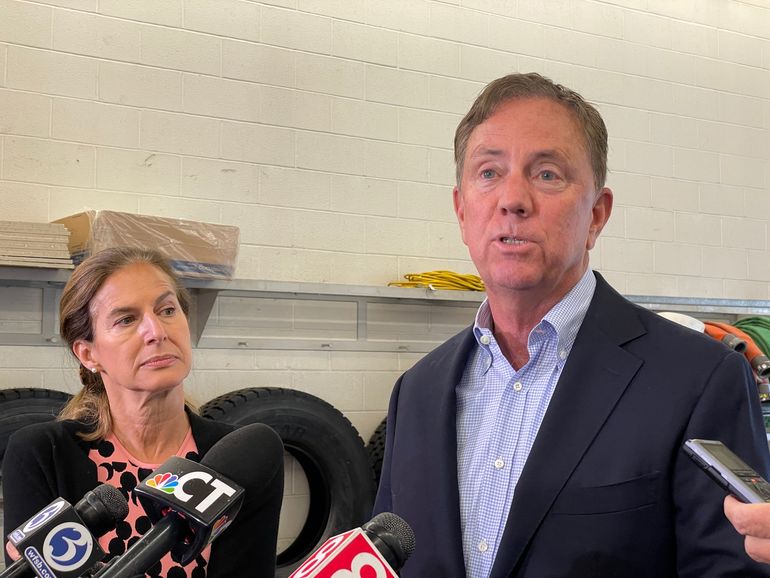
Processing Your Payment
Please do not leave this page until complete. This can take a few moments.
- News
-
Editions
View Digital Editions
Biweekly Issues
- May 13, 2024
- April 29, 2024
- April 15, 2024
- April 1, 2024
- March 18, 2024
- March 4, 2024
- February 19, 2024
- February 5, 2024
- January 22, 2024
- + More
Special Editions
- Lists
- Viewpoints
- HBJ Events
- Business Calendar
- Custom Content
Bordonaro: On reelection hopes, Lamont’s actions speak louder than his words
 Mark Pazniokas | CT Mirror
Gov. Ned Lamont and, at left, Lt. Gov. Susan Bysiewicz.
Mark Pazniokas | CT Mirror
Gov. Ned Lamont and, at left, Lt. Gov. Susan Bysiewicz.
Gov. Ned Lamont is running for reelection, but even if he didn’t recently officially announce it, his actions lately make it clear he wants an additional four years in office.
First, earlier this month he hinted at the idea of an election-year tax cut by expanding the state property tax credit.

Then, about a week later, the Democratic governor said he would no longer pursue a controversial climate change proposal that was sidetracked after some state lawmakers argued it would increase gas prices.
Oh, and that controversial effort to reintroduce tolls in Connecticut, which nearly derailed Lamont’s governorship in his first year in office, is also off the table. With Connecticut slated to receive $5.38 billion from the federal government’s recently passed infrastructure bill, tolls are no longer needed, he said.
“We had that debate, the debate is done,” Lamont recently told WFSB.
Meantime, Lamont has been promoting the state’s budget surplus and $3.1 billion rainy day fund, while touting the recent relocation of a few out-of-state companies to Connecticut as a “Connecticut Comeback.”
You can expect to hear that phrase used often next year as Lamont hits the campaign trail.
With the governor abandoning some of his most controversial policy proposals, and with his still relatively high approval ratings from how he handled the pandemic, the reality is Lamont will be tough to beat in 2022.
And that’s a major reversal in fortunes for a governor who was looking at a tough road pre-pandemic. In Jan. 2020, before COVID-19 became part of our everyday lexicon, Lamont’s disapproval rating hit 41.3%, according to a Sacred Heart University poll, as residents were frustrated with the state’s overall economy and Lamont’s stance on tolls.
He campaigned on a platform that favored tolling only out-of-state trucks, then quickly pivoted once in office to a general tolling policy that would impact all drivers in the state.
His approval ratings took a major hit.
In many ways, the pandemic ignited a “Lamont Comeback.” His steady leadership over the past year and a half has largely been viewed favorably, even by the business community. He did temporarily institute shutdowns, but he also was quicker to reopen the economy than other Blue States.
Republicans have tried to make political hay out of the continued extension of Lamont’s emergency COVID-19 powers, but I don’t think that will have long-term political ramifications, other than maybe galvanizing some of the GOP’s already committed Connecticut base.
Also helping Lamont is Democratic control in Washington, D.C. The billions of federal dollars that have flowed into Connecticut during the pandemic, and will continue to flow in the years ahead, have helped fill the state’s budget coffers, creating budget stability — a largely foreign concept in the Land of Steady Habits over the last decade.
It’s still early, but if the national economy continues to improve, Connecticut begins to fill the tens of thousands of open jobs it has, inflation gets held in check, and supply chain issues begin to ease, Republicans will have a tall order trying to defeat Lamont next fall.
The GOP needs a rock star candidate to compete.
Look, Connecticut is still in desperate need of breaking up its one-party rule system, in which Democrats have controlled state government essentially since the Rell administration.
In many ways, it’s caused our business climate to become less competitive over the years. And once the federal money spigot slows, Connecticut’s longer-term budget problems will still remain an issue.
Lamont does have weaknesses. He’s flip-flopped on some key issues. And Connecticut’s economy is recovering more slowly from the pandemic than many other states.
Employers’ inability to find workers is a national issue, but it seems to be a particularly acute problem here.
The GOP also did flip some seats in local elections this year with a strong focus on public safety, among other issues.
But in general, the state Republican party hasn’t done itself many favors in terms of making itself relevant.
For Republicans to regain their footing they need a more positive vision for the state, steeped in fiscal conservatism and a pro-business approach.
Simply complaining about Democratic control and bashing the state to the press and voters hasn’t proven effective. And I don’t think it will be in the future.

2022 Giving Guide
This special edition informs and connects businesses with nonprofit organizations that are aligned with what they care about. Each nonprofit profile provides a crisp snapshot of the organization’s mission, goals, area of service, giving and volunteer opportunities and board leadership.
Learn more
Subscribe
Hartford Business Journal provides the top coverage of news, trends, data, politics and personalities of the area’s business community. Get the news and information you need from the award-winning writers at HBJ. Don’t miss out - subscribe today.
Subscribe
2024 Book of Lists
Delivering Vital Marketplace Content and Context to Senior Decision Makers Throughout Greater Hartford and the State ... All Year Long!
Read Here-
2022 Giving Guide
This special edition informs and connects businesses with nonprofit organizations that are aligned with what they care about. Each nonprofit profile provides a crisp snapshot of the organization’s mission, goals, area of service, giving and volunteer opportunities and board leadership.
-
Subscribe
Hartford Business Journal provides the top coverage of news, trends, data, politics and personalities of the area’s business community. Get the news and information you need from the award-winning writers at HBJ. Don’t miss out - subscribe today.
-
2024 Book of Lists
Delivering Vital Marketplace Content and Context to Senior Decision Makers Throughout Greater Hartford and the State ... All Year Long!
ABOUT
ADVERTISE
NEW ENGLAND BUSINESS MEDIA SITES
No articles left
Get access now
In order to use this feature, we need some information from you. You can also login or register for a free account.
By clicking submit you are agreeing to our cookie usage and Privacy Policy
Already have an account? Login
Already have an account? Login
Want to create an account? Register
Get access now
In order to use this feature, we need some information from you. You can also login or register for a free account.
By clicking submit you are agreeing to our cookie usage and Privacy Policy
Already have an account? Login
Already have an account? Login
Want to create an account? Register





0 Comments